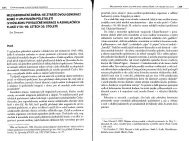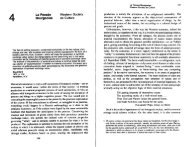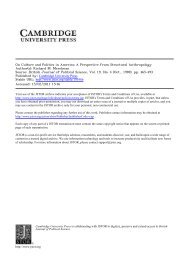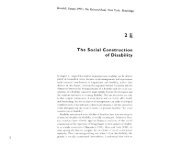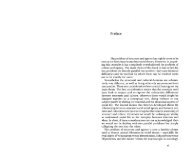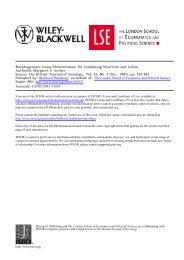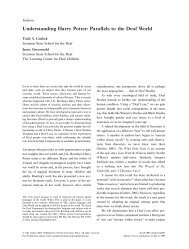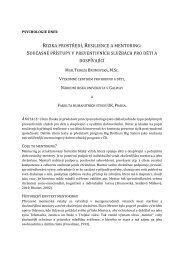Culture and Practical Reason Two Paradigms of ... - Moodle
Culture and Practical Reason Two Paradigms of ... - Moodle
Culture and Practical Reason Two Paradigms of ... - Moodle
- No tags were found...
You also want an ePaper? Increase the reach of your titles
YUMPU automatically turns print PDFs into web optimized ePapers that Google loves.
Chapter <strong>Two</strong> 112 <strong>Culture</strong> <strong>and</strong> <strong>Practical</strong> <strong>Reason</strong><strong>Two</strong> <strong>Paradigms</strong> <strong>of</strong> Anthropological Theory113ter <strong>of</strong> the sign directly, as a logical consequence <strong>of</strong> the distinction betweenthe individual fact <strong>and</strong> the social-exactly because individual sensation isonly a fleeting fact which as social beings we have the means <strong>and</strong> theliberty to represent in other tenns:A sensation or an image always relies upon a detenninate object, orupon a collection <strong>of</strong> objects <strong>of</strong> the same sort, <strong>and</strong> expresses themomentary condition <strong>of</strong> a particular consciousness; it is essentiallyindividual <strong>and</strong> subjective. We therefore have considerable liberty indealing with the representations <strong>of</strong> such an origin. It is true that whenour sensations are actual, they impose themselves upon us in/act. Butby right we are free to conceive them otherwise than they really are, orto represent them to ourselves as occurring in a different order fromthat in which they are really produced. In regard to them nothing isforced upon us except as considerations <strong>of</strong> another sort [namely socialconsiderations] intervene. [Durkheim 1947 (1912), p. 14]42It must follow that for Durkheim the social fact, above all the collectiveconsciousness, is no simple recognition <strong>of</strong> material circumstance. Oppositionto this reduction would carry Durkheim, at least momentarily, beyondhis own sociological reflectionism. From the detennination <strong>of</strong> the meaningfulscheme by the social morphology, he moved to a detennination <strong>of</strong>the social morphology as meaningful-<strong>and</strong> <strong>of</strong> the meaningful syntax as suigeneris. "The ideal society," he insisted, "is not outside <strong>of</strong> the realsociety; it is part <strong>of</strong> it. ... For a society is not made up merely <strong>of</strong> the mass<strong>of</strong> individuals who compose it, the ground which they occupy, the thingswhich they use <strong>and</strong> the movements which they perfonn, but above all is theits place; for each civilization has its organized system <strong>of</strong> concepts which characterizesit" (ibid., p. 435).42. Elsewhere Durkheim writes <strong>of</strong>the alienation involved in such appropriation <strong>of</strong>individualexperience with a regret something like Marx's in the /844 Manuscripts: "We understaJldonly when we think in concepts. But sensory reality is not made to enter theframework <strong>of</strong>ourconcepts spontaneously <strong>and</strong> by itself. It resists, <strong>and</strong>, in order to make itconform, we have todo some violence to it, we have to submit it to all sorts <strong>of</strong>laboriousoperations that alter it so that the mind can assimilate it. However, we never completelysucceed in triumphing over its resistance. Our concepts never succeed in mastering oursensations <strong>and</strong> in translating them completely into intelligible terms. They take on aconceplUaJ fonn only by losing that which is most concrete in them, that which causesthem to speak to our sensory being <strong>and</strong> to involve it in action; <strong>and</strong>. in so doing,they become something fixed <strong>and</strong> dead. Therefore.we cannot underst<strong>and</strong> thingswithoutrenouncing the underst<strong>and</strong>ing <strong>of</strong> it. Doubtless, we sometimes dream <strong>of</strong> a science thatwould adequalely express all <strong>of</strong> reality; but this is an ideal that we can approachceaselessly, not one that is possible for us to attain" (Durkheim 1960 (1914), p. 329).idea which it forms <strong>of</strong> itself" (1914 [1912], p. 422). In disagreement withthe going historical materialism, Durkheim counterposed a "whole world<strong>of</strong>sentiments, ideas <strong>and</strong> images which, once born, obey laws all their own.They attract each other, repel each other, unite, divide themselves, <strong>and</strong>multiply, though these combinations are not comm<strong>and</strong>ed <strong>and</strong> necessitatedby the condition <strong>of</strong> the underlying reality" (ibid., p. 424; compare, however,the earlier remarks on Labriola, in Lukes 1972, p. 231). Note thateven within the sociological epistemology a fundamental twist appeared inthe relation <strong>of</strong> society <strong>and</strong> nature that could lead away from all reflectionism.Society, Durkheim was wont to say, comprises the "molds"within which are fonned the human experience. Consequently, the worldas known to man was a social world-precisely not a reflection, but insidesociety. The history <strong>of</strong> the world was the narrative <strong>of</strong> the tribe's existence,just as geographic space might be laid out from the central point <strong>of</strong> avillage. And the objects <strong>of</strong> this social existence were not merely classedisomorphically with man, in correspondence with the categories <strong>of</strong> men,they were thereby given a place within the human groups. ("For theAustralian, things themselves, everything which is in the universe, are apart <strong>of</strong>the tribe; they are constituent elements <strong>of</strong> it <strong>and</strong>, so to speak, regularmembers <strong>of</strong> it, just like men they have a determinate place in the generalscheme <strong>of</strong> organization <strong>of</strong> the society" [Durkheim 1947 (1912), p. 141 ].)If, as Durkheim put it, the universe does not exist except ins<strong>of</strong>ar as it isthought, then it has been encompassed within an even greater order; so thatit can no longer itself be thought to act simply from outside, in a purelynatural way. And in that theoretical event, the opposition to Marxism wasoverdrawn. Just as Durkheim would accord with Marx on the recognitionthat "man is not an abstract being, squatting outside the world," so theymust come together on the corollary proposition <strong>of</strong> a socialized orhumanized nature. Lukacs's description does for both: "Nature is a societalcategory. That is to say, whatever is held to be natural at any given stage <strong>of</strong>social development, however this nature is related to man, <strong>and</strong> whateverform his involvement with it takes, Le., nature's form, its content, <strong>and</strong> itsobjectivity are all socially conditioned" (1971, p. 234).This concept <strong>of</strong> the social appropriation <strong>of</strong> nature, <strong>of</strong> the natural order asa moral order, continues to inform the best structural anthropology, Britishor French. It was essential to Radcliffe-Brown's early work on Andamanesebelief <strong>and</strong> ceremonial, as well as his studies <strong>of</strong> totemism, taboo,<strong>and</strong> religion in general. It has been central also to the ethnographic enterprises<strong>of</strong> Evans-Pritchard <strong>and</strong> his students, as well as to more recent



